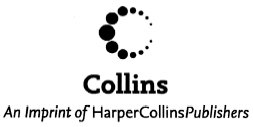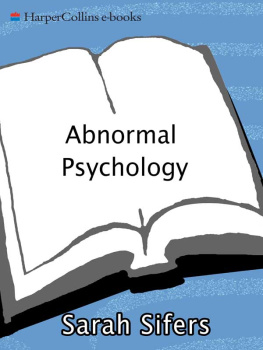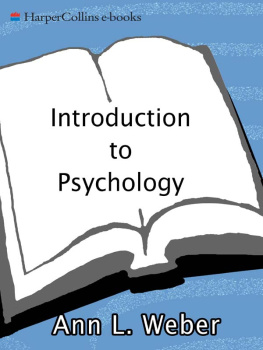Abnormal Psychology
3rd Edition
Sarah K. Sifers Ph.D.
Minnesota State University Mankato
Mankato, MN
Timothy W. Costello, Ph.D.
Joseph T. Costello, Ph.D.
Contributing Editor
Brad Mossbarger, Ph.D.
Austin Peay State University
Clarksville, TN

ABNORMAL PSYCHOLOGY. Copyright 1992, 2006 by HarperCollins Publishers. All rights reserved under International and Pan-American Copyright Conventions. By payment of the required fees, you have been granted the nonexclusive, nontransferable right to access and read the text of this ebook on-screen. No part of this text may be reproduced, transmitted, downloaded, decompiled, reverse-engineered, or stored in or introduced into any information storage and retrieval system, in any form or by any means, whether electronic or mechanical, now known or hereinafter invented, without the express written permission of HarperCollins ebooks.
Library of Congress Catalog-in-Publication has been applied for.
ISBN: 978-0-06-088145-0
EPub Edition SEPTEMBER 2011 ISBN: 978-0-06-211512-6
06 07 08 09 10 CW 10 9 8 7 6 5 4 3 2 1
Contents
The Field of Abnormal Psychology
The History of the Problem of Abnormal Behavior
Research in Abnormal Psychology
Psychodynamic, Humanistic, and Existential Perspectives
Behavioral, Cognitive, Biogenic, and Sociocultural Perspectives
Assessment and Classification
Psychodynamic Forms of Psychotherapy
Behavioral, Cognitive, and Biogenic Therapies
Anxiety Disorders
Somatoform and Dissociative Disorders
Psychological Factors Affecting Physical Conditions
Personality Disorders
Mood Disorders
Schizophrenia and Other Psychotic Disorders
Substance-Use Disorders
Sexual and Gender Disorders
Organic Disorders
Mental Retardation
Abnormal Behavior of Children and Adolescents
Eating and Sleeping Disorders
Legal Issues and Social Policy
The goal of this outline is to provide you with information about abnormal psychology. Specifically, you will find the symptoms, onset, causes, course, and common treatment methods of the most frequently noted disorders contained in the Diagnostic and Statistical Manual, 4th Edition, Text Revision. The outline provides information about and examples of research in abnormal psychology. Furthermore, it aims to educate you about historical and modern issues in abnormal psychology, including legal and social concerns. The comprehensive and yet concise nature of this outline make it an ideal resource not only for students of abnormal psychology but also for professionals and educators in psychology and related fields.
This outlines format provides an easy reference and helps you organize the material, thus facilitating learning. This concise, easy-to-access layout makes it ideal for a quick review or for gaining a basic understanding. The information provided includes a balance of historical context and modern research from multiple perspectives within the field. Each chapter contains review questions to assess for comprehension of the material and suggested readings if you would like a more in-depth or first-hand account of the topics covered. The outline also includes a glossary and index to facilitate rapid reference to key terms.
The outline begins with an overview of the field of abnormal psychology followed by the history of the discipline. Next is an outline of basic research strategies and issues within abnormal psychology, plus a description of the common theoretical orientations and their strengths and weaknesses. Following this introduction is a chapter on the assessment and classification of psychological disorders, and then a discussion of common approaches to the treatment of mental illnesses. Subsequent chapters focus on the major categories of disorders commonly identified in abnormal psychology. Closing the outline is a chapter on legal and social issues pertaining to abnormal psychology.
The current edition of this outline began with the work of Timothy W. Costello and Joseph Costello. Revisions to the text sought to maintain the quality of work and be consistent with the original authors vision, with updates for changes in the field from revisions to the Diagnostic and Statistical Manual to the quickly expanding literature on abnormal biopsychology. I am largely indebted to the foundation that Timothy W. and Joseph Costello began in this outline.
Sarah K. Sifers
The Field of Abnormal Psychology
C onsidering that approximately 44.3 million people living in the United States report meeting the diagnostic criteria for at least one psychological disorder in the past year, the issue is of top concern. Psychological disorders take many forms. They range from relatively unnoticed symptoms that largely affect only the individual with the disorder to behavior that can seriously impinge upon the rights of others. Psychological disorders also range from mild symptoms to more extreme symptoms or symptoms that seem bizarre.
In the modern world, high-tech communications reveal abnormalities around the corner as well as around the globe. Celebrities gain infamy for abuse of all kinds of substances and situations, while others are spotlighted for their suffering of such mental disorders as depression, eating disorders, and psychoses. On the societal level, whole groups of people marked by their cruelty, suicidal behavior, or common idiosyncratic behaviors have gained the attention of the world. The average person, however, still remains only vaguely aware of psychological disorders around him or her. Perhaps one knows a person with a psychological condition but, for the most part, holds opinions about abnormal behavior that are based on bits of information or erroneous reports. Common misconceptions about abnormal behavior are that it is incurable or inherited; that those with psychological disorders are dangerous; that abnormal behavior is always bizarre; that psychological disorders come from weakness of will or immoral behavior. These statements are either totally false or apply in only limited ways. Apart from misconceptions, even the question, How does one distinguish between normal and abnormal behavior? is a perplexing one.
Abnormal psychology is the branch of psychology that concerns itself with establishing criteria to distinguish abnormal from normal behavior, describing the various types of abnormal behavior, searching out the causes of that abnormal behavior, seeking appropriate means of treating it, and ultimately finding ways to prevent it. More formally, we can define abnormal psychology as the scientific study of behavior that is not considered normal.
The field of abnormal psychology is such a developing one that professionals have created and repeatedly modified the most frequently used classification system of psychological disorders. Originally issued in 1952 by the American Psychiatric Association, the Diagnostic and Statistical Manual (DSM) lists the symptoms and other related information about widely accepted psychological disorders. The most recently published manual, the Diagnostic and Statistical Manual, 4th Edition, Text Revision (DSM-IV-TR), was published in 2000. It provides a means of classifying all recognized psychological disorders and evaluating their severity. The manual uses five axes to enable clinicians to be precise about diagnosis and evaluation. The axes are:
Axis I: The clinician reports any recognized clinical syndromes except personality disorders and mental retardation.
Next page













